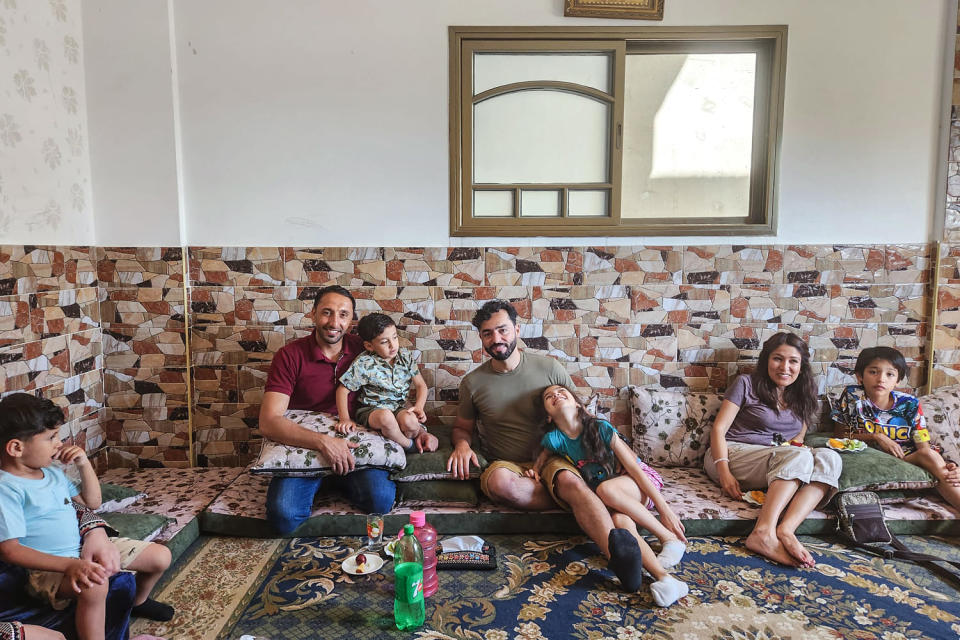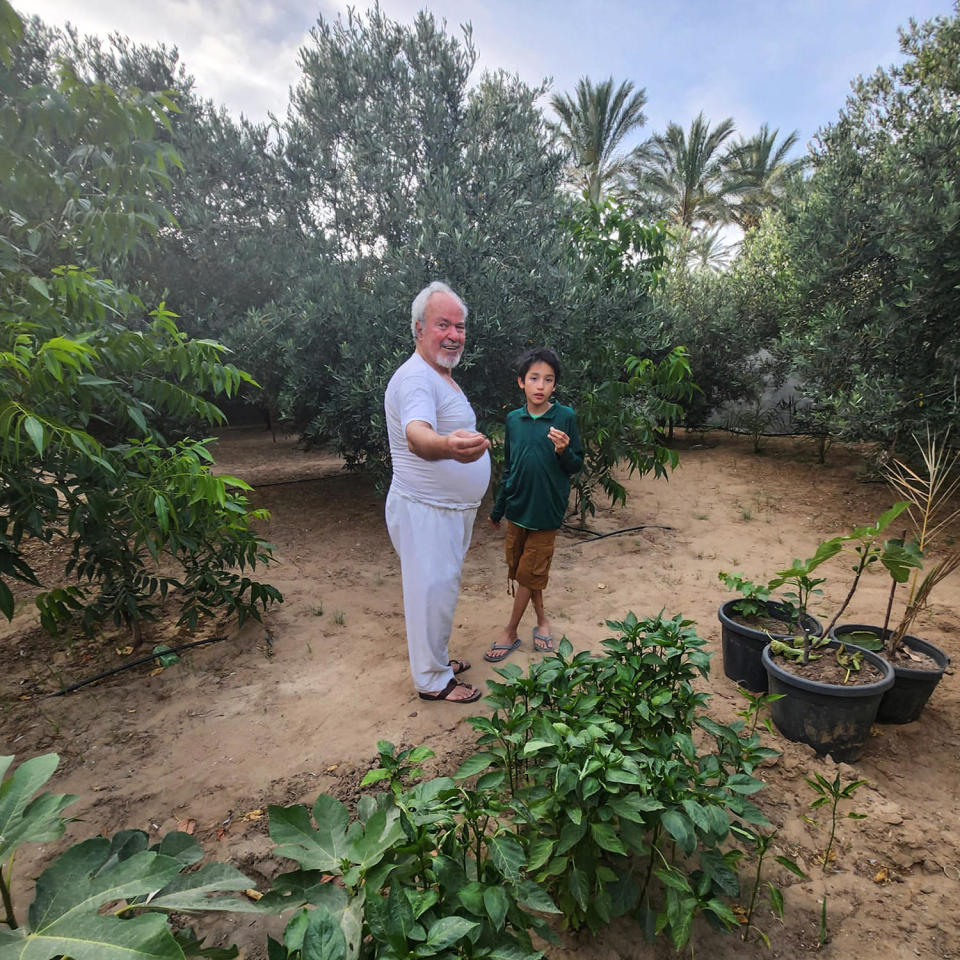Told to leave northern Gaza, this Palestinian family is staying put
Every day, Omyma Olwan and her family get a robocall from the Israeli military with a warning: “You might be a target and your life is in danger.”
Despite the calls, and the Israeli airstrikes that continue to pummel their neighborhood, the family has resolved to stay in their home in the northern Gaza Strip, where the Israeli military ordered 1.1 million people to evacuate earlier this month ahead of a potential ground assault.
Olwan, a retired teacher and mother of eight, is no stranger to war, having survived four of them in Gaza. But that has not made the decision to remain any easier.
“The bombing is left and right, north and south,” she told NBC News in a phone interview from eastern Gaza City, about 6 miles from the border with Israel, where she lives with her husband, three adult children, one daughter-in-law and two grandchildren, ages 1 and 4.
“There isn’t any safe place away from the bombing,” she said.

That was underlined this week in southern Gazan towns such as Khan Younis, where health officials said Thursday that 77 people, mostly women and children, had been confirmed killed in overnight airstrikes by Israeli forces.
“Nowhere is safe in Gaza,” Lynn Hastings, the United Nations’ humanitarian coordinator for the Palestinian Territories, said in a statement Thursday, noting that evacuation routes have been bombed.
Palestinian health officials said Thursday that more than 7,000 people, including more than 2,900 children, had been killed in Gaza since Israel was attacked on Oct. 7 by Hamas, the militant group that controls the enclave. About 1,400 people, mostly civilians, were killed in the attack on Israel, in which at least 224 people were also taken hostage.
Israel’s evacuation order was criticized by the U.N., which said it would have “devastating humanitarian consequences.” Many residents of northern Gaza have nonetheless complied, contributing to the 1.4 million people who have been displaced by the conflict out of Gaza’s population of 2.2 million.
The timing or certainty of an Israeli ground assault remains unclear. The Israeli military said Friday that it had conducted a ground raid in northern Gaza, its second this week. It said Thursday that the first raid had been conducted as “part of preparations for the next stages of combat.”
As Olwan hears stories of former students being killed and bombs demolishing mosques, grocery stores and residential buildings with entire families inside, she is acutely aware of the possibility that she could lose one of her own children in an instant.
“The decision to stay was hard and the decision to leave was also problematic,” she said.
Sticking together
When the evacuation order was issued on Oct. 13, the Alhayeks debated what to do. While younger family members argued for going south, which was deemed safer at the time, older ones were reluctant to make a move that could disrupt their access to medications and other basic necessities that could be “impossible” to get in overcrowded southern makeshift shelters.
One thing the family would not do, however, was split up.
“Either we’re living together or we’re dying together, but we’re staying together,” Olwan’s eldest son, Said Alhayek, who lives in Las Vegas with his wife and two children, said the family concluded after several days of deliberations on group calls.
Like many Palestinian families, the Alhayek family is large and sprawls across continents. Several of the siblings have long since left Gaza, a densely populated Palestinian enclave whose economy has been crippled by a 16-year land, air and sea blockade enforced by Israel and supported by Egypt. The blockade has made it difficult for the scattered members of the Alhayek family to see each other often.
The war has created an increasingly dire humanitarian situation in Gaza, where an Israeli siege has all but cut off supplies of fuel, water and electricity. A representative for UNRWA, the U.N. relief agency for Palestinian refugees, said Thursday that without fuel, it would be forced to suspend or reduce services for the more than 600,000 people sheltering at 150 of its facilities across the territory.
Nearly half of all housing units in Gaza have been damaged or destroyed, according to the U.N., and the Gaza Health Ministry has said the health care system “is in a state of complete collapse.”
Palestinian first responders say they are struggling to identify all the dead and are burying unidentified people in mass graves. Some families in Gaza, where half the population is under 19, have started wearing ID bracelets so their loved ones can find them if they are killed.
The Israeli military says it distinguishes between civilians and combatants and is only striking legitimate Hamas targets. But for Gazans who fear every night could be their last, that is hardly reassuring.
“The reality is the Israeli army has very little credibility in Gaza,” Said Alhayek said. “People try to do what’s in their best interest, but they don’t necessarily take the Israeli Army’s word — ‘Oh, it’s not safe to stay here’ — because we’ve seen it.”
His father, Hamed, a 72-year-old retired doctor, is reluctant to leave the family’s home in Gaza City’s Al-Tofa neighborhood, which he spent years saving up to expand. He inherited part of the plot from his late father and is an avid gardener who enjoys tending his mango and date trees.
“Portions of our house are still his father’s rooms,” Said Alhayek said, adding that his father sometimes sleeps in one of them.
“I think it’s really hard sometimes for people to understand that if you live in a place that has all your memories, all of your life, your memories, your father’s memories, would you just leave it?” he added.
‘We didn’t hurt anyone’
Israeli bombings keep the family up all night, and there is no more than four hours of electricity a day. Internet service and local cell reception is minimal.
Olwan’s husband and two sons, Oday and Mohammad, line up for up to six hours to collect bread rations, and the family struggles to obtain safe drinking water.

The family is also still reeling from news of the explosion at al-Ahli Hospital, which is estimated to have killed hundreds of Palestinians taking shelter there. The hospital is a 15-minute walk from their home.
“Said’s father used to be treated there when he was young,” Olwan said. “We older people always go there.”
But they could face even worse conditions in the south, she said. Heavy Israeli bombardment there has left the family more convinced of its decision to stay put.
Olwan worries about her sister, who has multiple sclerosis and evacuated to the south with their mother. She has run out of medication, Olwan said, and has no way of getting to the hospitals nearby, which are inundated with civilian casualties.
“If she doesn’t get her medicine, she can’t walk,” she said.
Olwan’s youngest daughter, Yara, 21, who is training to become a dentist, said a friend from school was recently killed in an Israeli strike in Khan Younis.
“Khan Younis is in the south of Gaza, the place where they told us to flee to. It’s supposed to be safe,” she said.
When there is enough connectivity, Yara Alhayek said, she gets “horrible” updates from other friends in Khan Younis, including one who said she had seen “a woman who lost her legs” under the rubble of a residential building next door that was hit by an airstrike.
“If this all ends, is anyone going to stay OK after seeing that?” Yara Alhayek said.
With a potential Israeli ground invasion looming, the family says they could still change their minds about staying.
“If they decide to enter and if we feel there is a tremendous danger, we will surely leave,” Olwan said.
In the meantime, she finds a semblance of comfort in her faith.
“We didn’t hurt anyone or do anything terrible to anyone,” she said. “Therefore, God willing, we will be safe.”
This article was originally published on NBCNews.com

